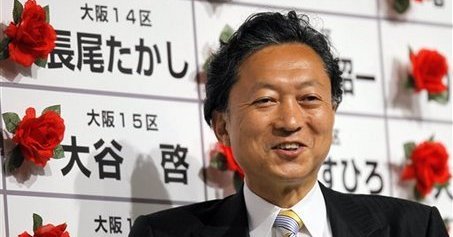As a matter of fact, people all over Japan decided to use their vote as a weapon to bring about the change that was much needed. The elections held by the former prime minister on the 31st of August, after a crushing defeat in Tokyo, are considered to be a turning point and the beginning of a new era, an era in which in the words of Mr. Hatoyama himself sees the end of bureaucracy and most importantly the rapid growth of a sustainable economy.
It is no secret that the economic downturn has hit the world’s second biggest economy with a similar intensity as in the other nation states and it was the way Mr. Aso handled the economic recession that made people across Japan realize that a change in government was needed. For the past year, Mr. Aso failed to take concrete decisions and to implement the necessary policies to deal with the hardships that the recession was inflicting on the people. In fact he was accused by his own party and the than opposition party (DPJ) that his apparent indecision made the situation much worse than it really was. Once elected into office Mr. Hatoyama reassured the electorate that under his government the policy of ‘the survival of the fittest’ will definitely come to an end.
The new government is an untested government in office and this could have huge implications on Japan and its foreign policy.
Although Mr. Hatoyama speaks of big changes in the near future one has to bear in mind that the newly elected prime minister is a fourth generation politician whose grandfather founded the party therefore it is highly unlikely revolutionary. However what makes it hard to picture the great changes in policy that the prime minister promised in prior and post election period is that if one takes a look at the cabinet, one realizes that it is not different from LDP cabinet. This was quite a disappointment for those who expected diversity especially gender diversity. Hence at this point neither the Japanese public nor the international community could be certain that change is about to come, that the DPJ is any different from the LDP and that the policies implemented by the new government will alter the relationship of Japan with the rest of the world. In reality the new government is an untested government in office and this could have huge implications on Japan and its foreign policy. That is why it is of utmost importance that LDP, now in opposition keep the government in check by offering constructive criticism and helping out the government to ensure the well being of its citizens. Having said that the chance of this actually happening at the moment are remote as the party appointed yet another politician who has his eyes fixed on the past over young politicians who can surely shake up the party’s gerontocracy. This clearly illustrates that the LDP had not learnt a single thing from the recent defeats and the intentions of the party is not in fact to rebuilt itself.
The ‘new Japan’ will not hide away from the present day challenges but on the contrary strive to work with other states to find a solution.
On the other hand Mr. Hatoyama assured the member states at the U.N. General Assembly that the ‘new Japan’ will not hide away from the present day challenges but on the contrary strive to work with other states to find a solution. The prime minister repeatedly mentions ‘new Japan’ and it seems that he wants to send the message that change will come and that Japan from now on will not hesitate to take a particular course of action even if it threatens the its alliance with the United States or any other country. For years Japan was considered a mere ‘puppet’ in the hands of the U.S but as Mr. Hatoyama warned, Japan will not stand back while the U.S acts dominates the economies in Asia. There is no doubt that America had a great influence on not only Japan’s economy but Politics in general and this is manifested in the similarity of the pillars in which both democracies are built upon.
Japan’s prime minister also said that the time was ripe to deal with issues such as climate change, a sustainable recovery for the economy, issues related to peace-building, development and poverty and nuclear proliferation/disarmament. What was mostly astonishing during his speech however was the fact that Japan is now ready to reduce its carbon emissions and this means that Japan is willing to collaborate with other states and not planning to isolate itself as in the case of North Korea. Through out his speech the P.M kept hinting that Japan is not a threat and has no intention to adopt a radical foreign policy that could threaten the security of other states. But what will Japan actually do remains to be seen.
Governments across Europe and the U.S are not the only ones who are concerned about the so-called power transition and the beginning of an era initiated by the august elections. China has expressed concerns about the fall of yet another ‘one party system’. While people in Japan and in the developed world consider the election results as a triumph for democracy, China worries about how observers in China are blaming the downfall of the LDP on the ‘one party system’ and this in turn has implications for China.
When it comes to domestic policies Mr. Hatoyama proposed several policies that would promote education, competition, employment and so on.
However the question that is still looming in the minds of many is that will Mr. Hatoyama’s government deliver? And what are the implications on the international community? What we actually know is that only time will tell.

Follow the comments: |
|
